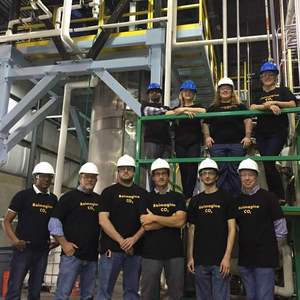White Dog Labs advances in $20 million Carbon Xprize contest




WHITE DOG LABS
October 24, 2016
BY Sue Retka Schill
New technology developer White Dog Labs has been selected as a semifinalist in the $20 million Carbon Xprize, announced shortly after its peer-reviewed research paper was published in the journal Nature Communications.
The research paper, “CO2 fixation by anaerobic non-photosynthetic mixotrophy for improved carbon conversion,” was published online at nature.com. “We are very proud to have our work in this prestigious peer review journal,” said Sass Somekh, executive chairman of White Dog Labs.
White Dog Labs is developing a MixoFerm process using a clostridia microorganism capable of consuming C5 and C6 sugars, along with the subsequent carbon dioxide produced, to make ethanol or, if genetically modified, other chemicals. The process increases the mass yield from a sugar fermentation by 50 percent or better. The peer-reviewed paper focuses on the technology’s application to acetone production, utilizing a modified organism that achieved 138 percent of the theoretical conventional fermentation yield.
Advertisement
The Carbon Xprize is a global competition among teams developing innovative carbon capture technology to convert carbon dioxide emissions into products with the highest net value. End products proposed by the entrants are varied, including biofuels, chemicals, enhanced concrete, toothpaste, nanotubes, fish food, fertilizer, and more.
White Dog Labs is listed among 27 semi-finalist teams hailing from the U.S., Canada, China, India, Switzerland and Scotland. Other U.S. teams focused on fuels and chemicals include EE-AGG, producing methanol; Innovator Energy, syngas and acetic acid; Low-Energy-Consumption CO2 Capture and Conversion, fuels and chemicals; Opus 12, plastics, fertilizers, gasoline; CAT.ALY.ST, biofuels; Dimensional Energy, hydrocarbon fuels; Hago Energetics, gas and liquid fuels.
Semi-finalists will demonstrate their technology at pilot scale at a location of their own choosing, using either simulated flue gas or real flue gas from coal or natural gas facilities. Over the course of a 10-month period, teams must meet minimum requirements and will be scored on how much CO2 they convert and the resulting net value of their products. Following Round 2 judging scheduled for November and December 2017, up to 10 teams that score the highest will share a $2.5 million milestone purse and move on to the finals of the competition. In the final round, teams will demonstrate their technology under real-world conditions at a larger scale to compete for the $20 million NRG Cosia Carbon Xprize.
Advertisement
For the Ethanol Producer Magazine profile of White Dog Labs, the technology and its potential for the ethanol industry along with other applications, click here.
Related Stories
The U.S. Department of Energy Bioenergy Technologies Office (BETO) announced up to $23 million in funding to support research and development (R&D) of domestic chemicals and fuels from biomass and waste resources.
The U.S. DOE has announced its intent to issue funding to support high-impact research and development (R&D) projects in two priority areas: sustainable propane and renewable chemicals and algal system cultivation and preprocessing.
Sens. Sherrod Brown, D-Ohio, and Pete Ricketts, R-Neb., in August introduced the Renewable Chemicals Act, a bill that aims to create a tax credit to support the production of biobased chemicals.
The Chemical Catalysis for Bioenergy Consortium, a consortium of the U.S. DOE’s Bioenergy Technologies Office, has launched an effort that aims to gather community input on the development of new biomass processing facilities.
USDA on March 8 celebrated the second annual National Biobased Products Day, a celebration to raise public awareness of biobased products, their benefits and their contributions to the U.S. economy and rural communities.
Upcoming Events










